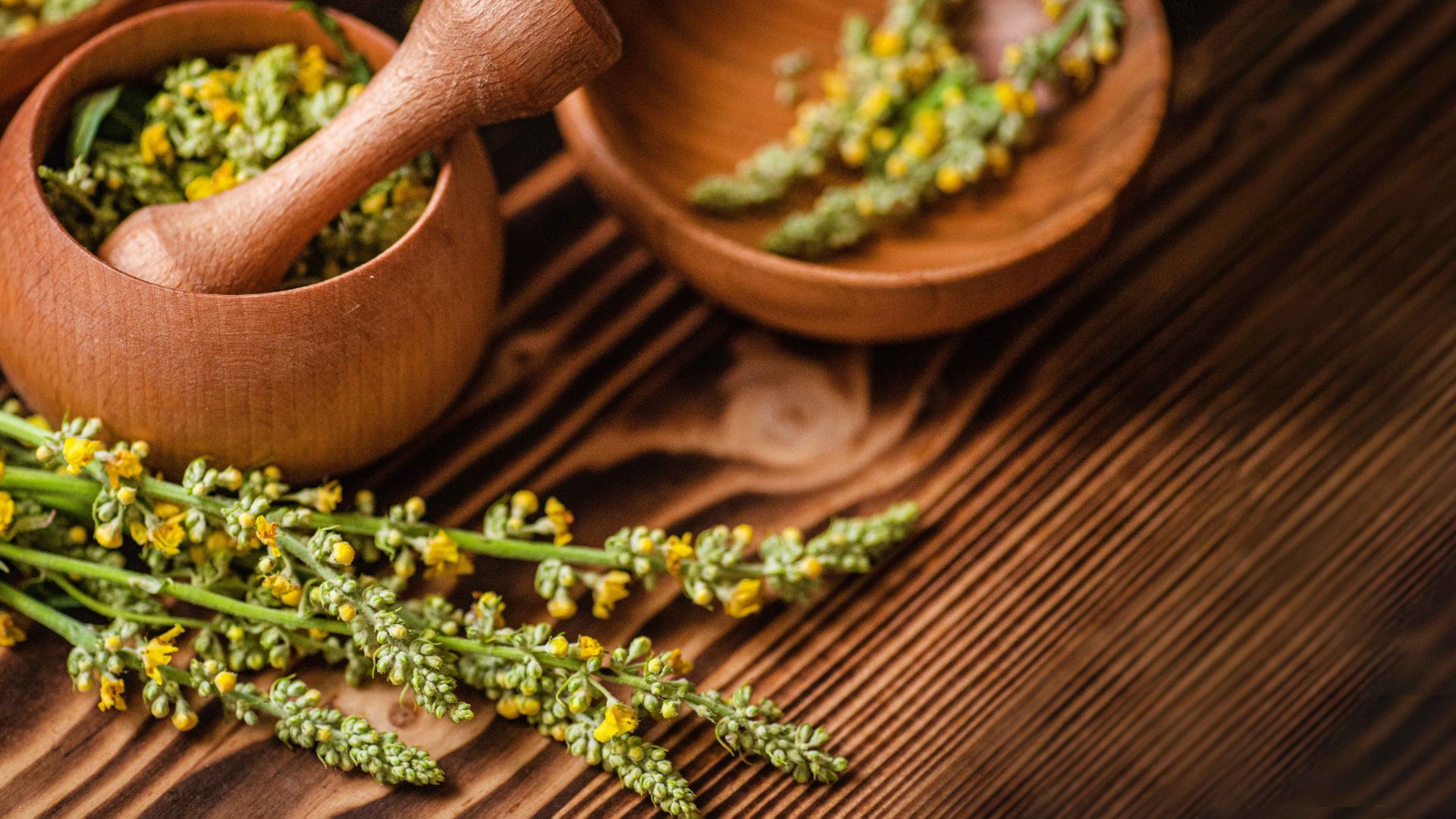Mullein: An Ancient Herb With Modern Health Benefits

Mullein, a flowering leafy plant that thrives much like a weed across the globe, contains components that have been used in traditional and naturopathic medicine for thousands of years. Some studies (1, 2, 3) are beginning to uncover its pain-relieving and antimicrobial properties following its long history used treating viral and bacterial infections alike.
It is the wealth of active compounds found in mullein that make it especially valuable and effective:
- Saponins: anti-inflammatory + pain-relieving
- Flavonoids: anti-inflammatory + antioxidant
- Phenylethanoid glycosides: anti-inflammatory + antiviral
- Iridoids: anti-inflammatory
The type of mullein plant most used for treatment of animals and humans is common mullein, or Verbascum thapsus. For use, the leaves and flowers are used fresh or dried to make hot and cold oils, creams, teas, and tinctures.
For Respiratory Health
In the 1800s, mullein was used to treat people suffering with tuberculosis across the western world. Fast forward hundreds of years, it is still used by traditional medicine practitioners to alleviate systems and treat respiratory symptoms such as cough, congestion, bronchitis, and asthma.
For Ear Infections
One promising study of over 150 children (1) found mullein to be an effective pain relief agent against ear infections. And while not commonly used in traditional medical settings, it could be a beneficial addition to any course of treatment for ear infection. However, mullein alone should not be used to treat ear infections and as symptoms appear, a doctor should be consulted for a full prescriptive protocol.
For Inflammation
One of muellein’s most robust offerings is its antiinflammatory effect. It has long been used as a traditional anecdote for localized and general inflammation and swelling in the body, which is present in so many conditions, diseases, symptoms, and syndromes. As we know, inflammation in itself can cause damage to the body, so anything to mitigate that can be hugely beneficial.
One study indicates it has a promising application in difficult-to-manage conditions such as osteoarthritis and arthritis. (4)
How To Use It
Mullein and its parts, either flowers or leaves, can be extracted as an oil to be used in creams or drops or used in dry form for teas, blends, and tinctures.
Mullein Oil
Mullein oil can be purchased in stores or online or made one of two ways. It is either infused in hot oil or cold steeped over a longer period of time. If you are attempting to make it yourself, be sure to consult an expert to ensure the integrity and safety of your healing agent.
The oil is often used topically to alleviate earaches and soothe irritated skin conditions such as eczema or dermatitis. It can also be applied to ease joint pain and muscle soreness. To take advantage of its promising potential for respiratory health, the oil can be rubbed on the chest or back.
Mullein Leaf Tea
With a gentle, earthy flavor, the mullein leaf is an herbal tea with many potential health benefits. Ingested in this way, it may provide respiratory relief and deliver overall anti-inflammatory benefits. Mullein tea may also be used for its mild sedative effects, which can promote relaxation and deeper sleep, which can be healing unto itself.
Side Effects
While the known side effects of mullein are rare, they are important to consider. It may cause irritation to skin or gastric if you are reactive or allergic to any of its compounds. It also has the potential to interfere with medications and should never be used if pregnant or breastfeeding. And with any supplement or health aid, consult with your doctor and take necessary precautions to avoid negative side effects.
If you want to begin a conversation with an expert in functional health, schedule your telehealth consultation today.
Start Your Health Journey Today
FUNCTIONAL MEDICINE CONSULTATIONS FOR PEOPLE AROUND THE WORLD
- Sarrell, E. M., Cohen, H. A., & Kahan, E. (2003). Naturopathic treatment for ear pain in children. Pediatrics, 111(5), e574-e579.
- Rajbhandari, M., Mentel, R., Jha, P. K., Chaudhary, R. P., Bhattarai, S., Gewali, M. B., ... & Lindequist, U. (2009). Antiviral activity of some plants used in Nepalese traditional medicine. Evidence‐Based Complementary and Alternative Medicine, 6(4), 517-522.
- Mahdavi, S., Amiradalat, M., Babashpour, M., Sheikhlooei, H., & Miransari, M. (2020). The antioxidant, anticarcinogenic and antimicrobial properties of Verbascum thapsus L. Medicinal Chemistry, 16(7), 991-995.
- Dimitrova, P., Georgiev, M., Khan, M., & Ivanovska, N. (2013). Evaluation of Verbascum species and harpagoside in models of acute and chronic inflammation. Open Life Sciences, 8(2), 186-194.
The information on this website has not been evaluated by the Food & Drug Administration or any other medical body. We do not aim to diagnose, treat, cure or prevent any illness or disease. Information is shared for educational purposes only. You must consult your doctor before acting on any content on this website, especially if you are pregnant, nursing, taking medication, or have a medical condition.
Our content may include products that have been independently chosen and recommended by Dr. Will Cole and our editors. If you purchase something mentioned in this article, we may earn a small commission.

BY DR. WILL COLE
Dr. Will Cole, DNM, IFMCP, DC is a leading functional medicine expert who consults people around the globe, starting one of the first functional medicine telehealth centers in the world. Named one of the top 50 functional and integrative doctors in the nation, Dr. Will Cole provides a functional medicine approach for thyroid issues, autoimmune conditions, hormonal imbalances, digestive disorders, and brain problems. He is also the host of the popular The Art of Being Well podcast and the New York Times bestselling author of Intuitive Fasting, Ketotarian, Gut Feelings, and The Inflammation Spectrum.

Gut Feelings
Healing The Shame-Fueled Relationship
Between What You Eat And How You Feel
